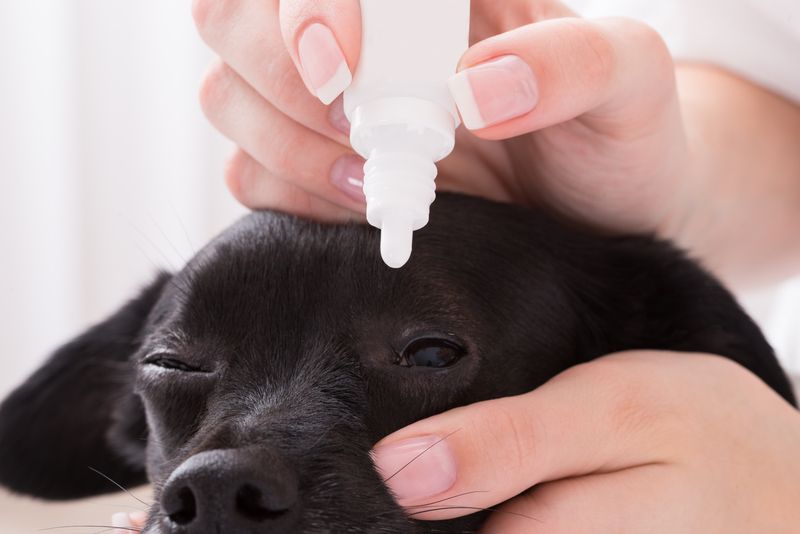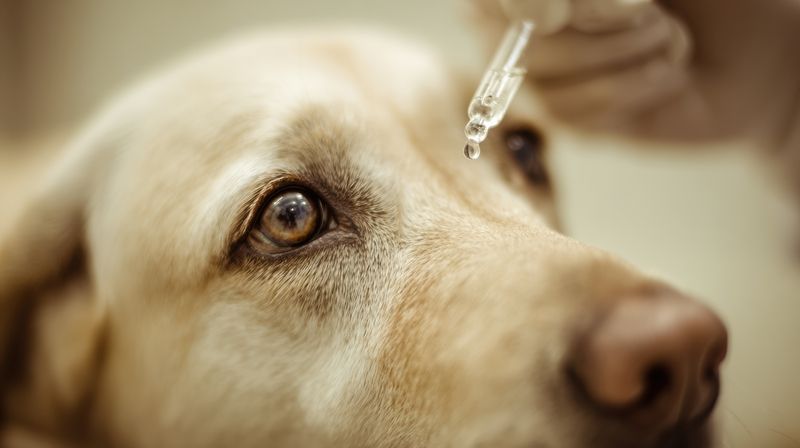Veterinary Ophthalmic Care • Prescription Required
Compounded Veterinary Eye Drops
Customized sterile eye medications for pets — formulated by Rock Ridge Pharmacy for conditions such as glaucoma, dry eye, and corneal ulcers, under veterinarian direction.
Expert Pharmaceutical Solutions for Your Pet's Eye Health Needs
Our ophthalmic solutions are prepared through our PCAB-accredited compounding partner in a USP <797>-compliant, ISO-class sterile facility. These are not one-size-fits-all treatments—they are pharmacy-grade, personalized medications formulated with the same precision and integrity we’ve offered our human patients since 1950.
From custom concentrations to preservative-free formulations, Rock Ridge Pharmacy provides access to premium veterinary eye drops—fast, safe, and with full pharmacist support.
Veterinarian-prescribed. Pharmacist-guided. Pet-approved.

What Are Sterile Compounded Veterinary Eye Drops?
Sterile veterinary eye drops are customized ophthalmic medications prepared under USP <797>-compliant sterile conditions. At Rock Ridge Pharmacy, we compound eye drops tailored to the unique needs of dogs, cats, and other pets when commercial products are unsuitable or unavailable.
Custom Formulations
Tailored to your veterinarian’s prescription — from custom concentrations to preservative-free solutions.
Sterile & Safe
Prepared in an ISO-class sterile facility under USP <797> standards for safety and purity.
Wide Range of Uses
Effective for dry eye, corneal ulcers, glaucoma, uveitis, and other eye conditions in pets.
Pharmacist & Vet Collaboration
Veterinarian-prescribed and pharmacist-guided to ensure accuracy, safety, and effective outcomes.
Common Veterinary Eye Medications Available
Rock Ridge Pharmacy compounds a wide range of veterinary ophthalmic solutions, tailored to your pet’s specific needs under veterinarian guidance.
Immunosuppressive Medications
Cyclosporine (gold standard for dry eye), Tacrolimus for refractory cases, and Cyclosporine/Tacrolimus combinations for complex conditions.
Anti-Inflammatory Medications
Prednisolone Acetate (corticosteroid), Desmopressin Acetate (hormone therapy), and Flurbiprofen (NSAID for post-surgical care).
Glaucoma Medications
Demecarium Bromide (long-acting cholinesterase inhibitor) and Pimobendan (cardiac drug used in specific ocular cases).
Antiviral Medications
Cidofovir (for FHV-1 eye infections) and Idoxuridine (herpes keratitis treatment).
Antibiotic & Antifungal Medications
Ketoconazole (antifungal), Metronidazole (anti-parasitic/antibacterial), and other targeted therapies.
Specialized & Pain Management
Gabapentin, Theophylline, Ursodiol, Buprenorphine, Budesonide, and Cisapride for side-effect management.
How Do Sterile Veterinary Eye Drops Work?
These ophthalmic solutions deliver targeted treatment directly to the eye’s surface, ensuring safety, precision, and effectiveness.

Reduce Inflammation
Corticosteroids or NSAIDs calm conjunctival and corneal inflammation.
Fight Infections
Antibacterial, antiviral, or antifungal drops treat ocular infections.
Relieve Dryness
Stimulates natural tear production, easing discomfort and chronic dry eye.
Lower Eye Pressure
Glaucoma drops lower intraocular pressure to protect vision.
Promote Healing
Growth factors and immune agents support corneal repair.
Immune Modulation
Suppresses autoimmune inflammation in uveitis and keratitis.
All sterile eye drops are compounded in compliance with USP <797> standards at our PCAB-accredited facility, ensuring safety and quality for your pets.
Explore Our Sterile Veterinary Eye Drop Medications
Rock Ridge Pharmacy compounds a wide range of veterinary ophthalmic solutions to support dogs, cats, and other pets.
Each prescription is prepared in a USP <797> sterile, PCAB-accredited facility to ensure safety, purity, and effectiveness.
Click on each option below to learn more.
Cyclosporine & Tacrolimus
Synergistic immunosuppressive therapy for complex ocular cases.
Learn MoreStorage & Handling Instructions for Veterinary Eye Drops
Proper storage and handling of sterile compounded eye drops ensure their safety, sterility, and effectiveness for your pet’s care.
Storage Guidelines
- Store in the refrigerator (36°F–46°F / 2°C–8°C), unless otherwise specified on the label.
- Do not freeze — freezing can damage the medication’s integrity.
- Keep the dropper tip sterile; never touch it to the eye, hands, or other surfaces.
- Shake gently if a suspension is prescribed (your pharmacist will advise).
- Discard after the beyond-use date printed on the label.
Always follow your veterinarian’s dosing and duration instructions. For storage questions, call (201) 444-4190 or email info@rockridgepharmacy.com.
Safety & Use Considerations
Sterile ophthalmic drops are sensitive to contamination. Always wash your hands before applying, follow the exact dosing schedule, and monitor your pet for improvement or side effects such as eye irritation, redness, or unusual discharge. Contact your veterinarian promptly if symptoms worsen or do not improve as expected.
Disclaimer: This information is for educational purposes only and does not replace professional veterinary advice. Always follow your veterinarian’s instructions when using compounded sterile eye drops.
Pharmacist Expertise & Storage Guidance
Our pharmacists work with veterinarians to create safe, effective eye drop therapies for pets. Follow these steps for treatment success:
Step 1: How We Customize Your Pet’s Medication
• Choose the right base (aqueous, oil, or emulsion) for best absorption.
• Adjust strength based on your pet’s size, condition, and history.
• Use preservative-free options for long-term therapy.
• Combine medications safely when multiple eye drops are prescribed.
Step 2: How to Store & Handle Safely
• Follow the label — some drops require refrigeration, others room temp.
• Keep bottles away from heat, sunlight, and moisture.
• While traveling, use insulated pouches to protect temperature-sensitive meds.
• Watch for changes in color, smell, or clarity — these may signal degradation.
• Dispose of expired or unused drops safely as instructed by your pharmacist.
Cost of Compounded Veterinary Eye Drops
All veterinary ophthalmic medications listed below are compounded in our USP <797>-certified sterile cleanroom, ensuring optimal sterility, safety, and consistency. For custom quotes, please contact Rock Ridge Pharmacy directly.
| Medication | Strength(s) | Base / Type | Volume Options |
|---|---|---|---|
| Cidofovir | 0.5% | Artificial Tears | 5 mL |
| Cyclosporine | 0.2% • 1% • 2% | Aqueous Suspension | 10 mL, 15 mL |
| 0.2% • 1% • 2% | Corn Oil Solution | 5 mL, 10 mL, 15 mL | |
| 2% | MCT Oil Solution | 10 mL, 15 mL | |
| Cyclosporine / Tacrolimus | 2% / 0.02% • 2% / 0.03% | Corn Oil Solution | 15 mL |
| Demecarium Bromide | 0.125% • 0.25% | Aqueous Ophthalmic Solution | 5 mL |
| Desmopressin Acetate | 0.01% • 0.02% | Aqueous Ophthalmic Solution | 10 mL |
| Flurbiprofen Sodium | 0.04% | Aqueous Ophthalmic Solution | 10 mL |
| Idoxuridine | 0.1% | Aqueous Ophthalmic Solution | 5 mL, 15 mL |
| Prednisolone Acetate | 1.25% • 1.5% | Aqueous Ophthalmic Suspension | 15 mL |
| Tacrolimus | 0.02% • 0.03% • 0.1% • 1% | Aqueous Suspension | 5 mL, 10 mL, 15 mL |
| 0.02% • 0.03% • 0.1% | Corn Oil / MCT Oil / Castor Oil | 5 mL, 10 mL, 15 mL |
📞 For the latest pricing, please call (201) 444-4190 or email info@rockridgepharmacy.com.

Why Choose Rock Ridge Pharmacy for Veterinary Eye Drops?
- PCAB-accredited & USP <797> sterile lab ensuring safety and quality.
- Veterinary compounding expertise trusted since 1950.
- Custom dosing & formulations for different species and conditions.
- Fast turnaround — most prescriptions ready in 1–2 business days.
- Pharmacist support for storage, use, and follow-up care.
Rock Ridge Pharmacy works with veterinarians and pet owners to provide safe, sterile, and personalized ophthalmic solutions backed by decades of trusted care.
FAQs about Veterinary Eye Drops at Rock Ridge Pharmacy
Can I use human eye drops for my pet?
No. Human eye drops may contain preservatives, additives, or drug concentrations that are not appropriate—or even harmful—for animals. Always use medication specifically prescribed by your veterinarian. Our pharmacists can explain the specific differences and why veterinary formulations are essential.
How long do compounded eye drops last?
Most sterile compounded eye drops are assigned a beyond-use date of 14 to 30 days, depending on the formulation. Because they're preservative-free or low in preservatives, they don't last as long as commercial products and must be stored properly. Our pharmacists determine stability based on extensive testing data.
How should I administer eye drops to my pet?
Gently hold your pet's head still, tilt it slightly upward, and place the drops directly into the affected eye. Avoid touching the dropper tip to the eye or fur. Our pharmacists provide detailed demonstration videos and can schedule one-on-one administration training if needed.
My pet is squirmy—what if I miss the eye or only get a partial dose in?
Try again when your pet is calm. It's important the medication reaches the eye, so a missed or partial dose should be corrected as soon as possible. Never force it in aggressively—contact our pharmacists for specialized tips, restraint techniques, or alternative delivery tools.
Can I reuse leftover drops from a past prescription if symptoms come back?
No. You should never reuse compounded eye drops after the expiration date. The sterility may be compromised, and symptoms might indicate a different or worsened condition. Always get a fresh prescription from your veterinarian. Our pharmacists can expedite emergency prescriptions when needed.
Are there any side effects I should watch for?
While most pets tolerate compounded eye drops well, watch for increased redness, excessive tearing, squinting, pawing at the eye, or signs of discomfort. These could signal irritation, allergy, or infection. Contact your vet immediately if these occur. Our pharmacists can also provide guidance on distinguishing normal healing responses from concerning reactions.
Can sterile veterinary eye drops be used for all animals?
These drops are typically formulated for dogs, cats, and some exotic pets, but not all species tolerate the same ingredients. That's why veterinary consultation is essential before compounding. Our pharmacists maintain species-specific dosing databases to ensure safe formulations for each type of animal.
Do I need to keep the drops in the fridge even while administering multiple times a day?
Yes. Keep the bottle refrigerated between doses and take it out just before administration. Return it to the fridge immediately after use unless your veterinarian or pharmacist says otherwise. Our pharmacists can provide insulated travel cases for pets requiring frequent dosing outside the home.
Will my pet need multiple medications in the same eye?
Sometimes, yes. If multiple drops are prescribed, space them 5–10 minutes apart to allow full absorption and avoid dilution. Always follow the order recommended by your vet. Our pharmacists provide detailed sequencing instructions and can compound combination formulations when appropriate.
Can I order refills for compounded eye drops?
Yes, but only if your veterinarian authorizes a refill on the original prescription. If your pet requires long-term treatment, we recommend ordering your refill a few days in advance to avoid interruptions in care. Our pharmacists can set up automatic refill reminders for chronic conditions.
How much do compounded veterinary eye drops typically cost?
Costs vary based on medication type, concentration, volume, and base vehicle, typically ranging from $35–125 per bottle. Our pharmacists can discuss cost-effective formulation options and work with your veterinarian to optimize both therapeutic outcomes and affordability.
Does pet insurance cover compounded medications?
Many pet insurance plans cover prescription medications when medically necessary. Our pharmacists can provide detailed receipts and documentation to support insurance claims and may offer direct billing arrangements with certain providers.
What makes Rock Ridge Pharmacy's compounded eye drops different?
Our PCAB-accredited facility, USP <797> compliance, specialized veterinary expertise since 1950, and dedicated pharmacist support throughout treatment set us apart. We offer custom concentrations, multiple base options, and preservative-free formulations not available elsewhere.

